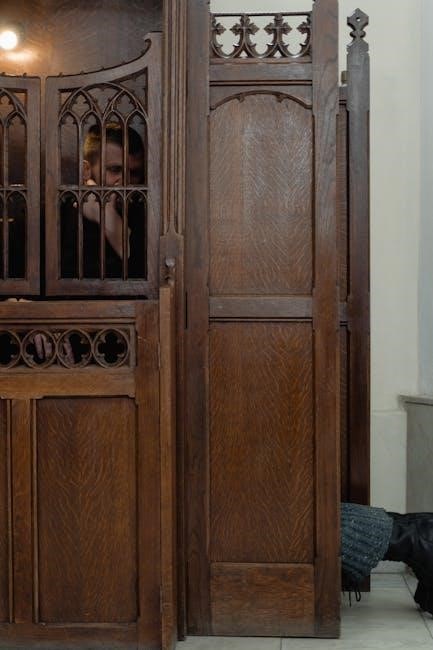Catholic confession is a vital sacrament for spiritual renewal, offering adults a pathway to forgiveness and reconciliation with God and the Church. Resources like Fr. Mike Schmitz’s Pocket Guide to the Sacrament of Reconciliation and Catholic Answers’ Examination of Conscience provide practical tools for a meaningful confession experience.
1.1 Understanding the Sacrament of Reconciliation
The Sacrament of Reconciliation, also known as Confession, is a sacred ritual where Catholics seek forgiveness for their sins. It restores their relationship with God and the Church, fostering spiritual healing. Through this sacrament, believers acknowledge their wrongdoings, express remorse, and receive absolution. Resources like The Pocket Guide to the Sacrament of Reconciliation by Fr. Mike Schmitz highlight how the Holy Spirit guides individuals to recognize their sins and embrace God’s mercy. This sacrament is not just about confessing faults but also about spiritual renewal and Strength, enabling adults to live a more virtuous and grace-filled life. It is a cornerstone of Catholic spirituality.
1.2 Importance of Regular Confession for Spiritual Growth
Regular Confession plays a pivotal role in fostering spiritual growth among adults. It provides an opportunity for self-reflection, accountability, and healing, allowing individuals to confront their sins and seek divine mercy. Guides like The Catholic Answers Guide to an Examination of Conscience emphasize how regular confession helps in identifying patterns of sin and cultivating a deeper understanding of God’s love. By confessing regularly, adults can experience a renewed sense of peace, clarity, and purpose in their faith journey. This practice strengthens their relationship with God, enabling them to live a more authentic and grace-filled life. Regular confession is thus essential for ongoing spiritual development.

Preparing for Confession
Effective preparation for confession involves prayerful reflection and self-examination, guided by resources like Fr. Mike Schmitz’s pocket guide, to ensure a heartfelt and meaningful experience.
2.1 Examining Your Conscience: A Step-by-Step Guide
Examining your conscience is a prayerful process that begins with asking the Holy Spirit for clarity and humility. Start by reflecting on your actions, words, and thoughts, using the Ten Commandments as a guide. Consider how you have lived out your faith, honored relationships, and treated others. Identify specific sins, such as unkindness, dishonesty, or neglect of prayer. Reflect on how these actions have impacted your relationship with God and others. Examine patterns of sin and their root causes, such as fear, pride, or lack of trust in God. Use guides like Fr. Mike Schmitz’s Pocket Guide or Catholic Answers’ resources to structure your examination. This step-by-step approach ensures a thorough and honest self-reflection, preparing you to confess your sins sincerely.
2.2 Reflecting on Sins and Their Impact on Your Life
Reflecting on your sins involves prayerfully considering how they have affected your relationship with God, others, and yourself. Begin by asking the Holy Spirit to reveal areas where you have fallen short. Examine specific instances where you may have acted selfishly, hurt others, or neglected your faith commitments. Consider how these actions have strained relationships, weakened your spiritual life, or led to emotional turmoil. Use resources like Catholic Answers’ Examination of Conscience to guide your reflection. This process helps you understand the gravity of your sins and fosters a deeper desire for reconciliation. Honest reflection leads to genuine sorrow and a commitment to change.

The Sacrament of Confession
The Sacrament of Confession offers adults a sacred encounter with God’s mercy, enabling spiritual healing and renewal through the forgiveness of sins. As highlighted in the Pocket Guide to the Sacrament of Reconciliation by Fr. Mike Schmitz, this sacrament restores one’s relationship with God and the Church. By acknowledging and confessing sins, individuals experience liberation from guilt and receive grace to live a more virtuous life. The sacrament is a vital component of Catholic spirituality, offering a pathway to reconciliation and deeper union with Christ.
3.1 The Rite of Confession: What to Expect
The rite of confession begins with a greeting by the priest, followed by a brief conversation or prayer to set a spiritual tone.
- The penitent then states their sins, being as specific as possible, while maintaining humility and honesty.
- The priest offers guidance, words of encouragement, and assigns a penance to aid in spiritual growth.
- The sacrament concludes with the penitent expressing sorrow through an act of contrition and receiving absolution from the priest.
Resources like Fr. Mike Schmitz’s guide emphasize the importance of preparation and sincerity, ensuring a meaningful encounter with God’s mercy during the rite.
3.2 How to Confess Your Sins Effectively
Confessing sins effectively involves prayerful preparation, honesty, and clarity.
- Begin by examining your conscience, using guides like Catholic Answers’ Examination of Conscience to identify specific sins and their impact.
- Express your sins clearly and succinctly, avoiding vague terms, to ensure a meaningful confession.
- Take responsibility for your actions and express genuine sorrow, demonstrating your commitment to spiritual growth.
Fr. Mike Schmitz’s Pocket Guide encourages penitents to approach confession with humility, fostering a deeper encounter with God’s mercy and grace.
Common Challenges and Solutions
Overcoming fear and embarrassment during confession can be addressed through prayer and reflection, while forgetting sins can be resolved by remaining calm and seeking guidance from confession guides.

4.1 Overcoming Fear or Embarrassment During Confession
Fear and embarrassment are common feelings when approaching confession, but remembering God’s merciful love can ease anxiety. Guides like Fr. Mike Schmitz’s Pocket Guide emphasize that confession is a safe space for healing. Reflecting on the sacrament’s purpose—to receive forgiveness and grow closer to God—can shift focus from self-consciousness to spiritual renewal. Additionally, understanding that priests are there to support, not judge, helps build confidence. Prayer before confession, asking the Holy Spirit for courage, can also alleviate nervousness, making the experience more meaningful and transformative.
4.2 What to Do If You Forget Your Sins During Confession
Forgetting sins during confession can be unsettling, but it’s important to remain calm and trust in God’s grace. Guides suggest that if this happens, one should inform the priest, who may offer prompts or reflections to jog memory. It’s also advisable to pray for the Holy Spirit’s guidance during the sacrament. After confession, if more sins come to mind, they can be confessed in a future session. Remember, sincerity and effort in preparing for confession are what matter most, not perfection. This approach ensures a fruitful experience, fostering spiritual growth and a deeper connection with Christ.

Resources for a Deeper Understanding
Explore guides like The Pocket Guide to the Sacrament of Reconciliation and Catholic Answers’ Examination of Conscience for practical insights. Online communities, such as r/Catholicism, offer additional support and discussions.
5.1 Recommended Guides and Prayer Books for Adults
For a deeper understanding, consider The Pocket Guide to the Sacrament of Reconciliation by Fr. Mike Schmitz, offering practical insights into the sacrament. Catholic Answers’ Examination of Conscience provides a comprehensive review of sins, covering commandments, sacraments, and daily life. These resources are ideal for adults seeking to enrich their confession experience. Additionally, prayer books like Prayer Companion for Confession offer reflective prayers to prepare your heart. Online PDF guides, such as those shared on platforms like Reddit’s r/Catholicism, compile multiple resources for a holistic approach to confession and spiritual growth.
5.2 Online Materials and Communities for Support
Online resources offer invaluable support for adults preparing for confession. Websites like Catholic Answers provide downloadable PDF guides, such as their Examination of Conscience, to help identify sins. Fr. Mike Schmitz’s Pocket Guide to the Sacrament of Reconciliation is also available online, offering spiritual reflections. Additionally, communities like Reddit’s r/Catholicism share user-compiled confession guides, fostering a supportive environment for discussion and encouragement. These online materials and forums empower adults to deepen their faith and approach confession with confidence and clarity.
Catholic confession empowers adults to embrace spiritual renewal and reconciliation through transformative grace, fostering a deeper connection with God and His Church.
6.1 The Transformative Power of Confession in Daily Life
The transformative power of confession in daily life lies in its ability to bring healing and renewal. By acknowledging and surrendering sins, individuals experience a deeper sense of freedom and grace. This sacrament fosters personal growth, strengthens relationships with God, and enhances spiritual resilience. Guides like Fr. Mike Schmitz’s Pocket Guide to the Sacrament of Reconciliation emphasize how regular confession can lead to a more authentic, faith-filled life. Through confession, adults can embrace a life of purpose and joy, living as children of God in a world that often challenges their faith.
